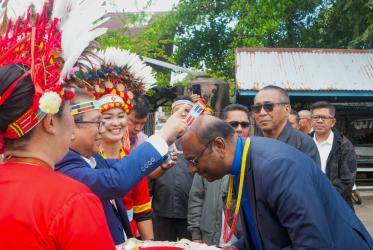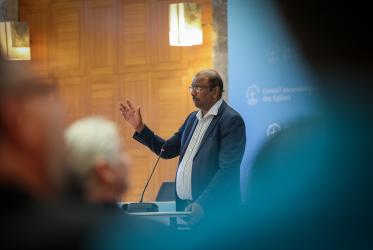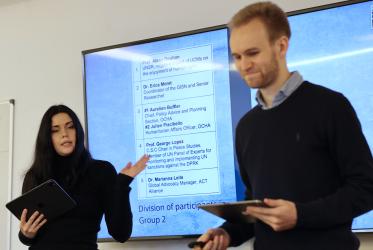WCC Central Committee, Geneva, 15-22 February, 2005
We are challenged by the vision of a church that will reach out to everyone, sharing,
caring, proclaiming the good news of God's redemption, a sign of the Kingdom and a
servant of the world. (Our Ecumenical Vision, 8th WCC Assembly, 1998.)
It is with profound sadness and deep anguish that the Central Committee meeting
in Geneva, Switzerland, in February 2005, takes note of one of the world's
deadliest natural catastrophes ever that struck the Indian Ocean region on 26th
December 2004. The massive waves that rushed in from the earthquake's epicentre
hours later engulfed the coastline cities of Indonesia, Thailand, Maldives, Sri
Lanka, India, Somalia, Tanzania and Myanmar (information of damage and loss
of life in the latter country is not available because of the nature of the ruling mil-
itary junta) causing immeasurable loss of lives, of local people and tourists, destruction
of whole communities, destruction of properties and human suffering. It is
a matter of deep regret that technology available to warn of imminent tsunamis
was not in place in the Indian Ocean. An advance warning system would have
saved thousands of lives. Steps must now be taken for the installation of an advance
warning system in all unprotected oceans.
The plight of children who have suffered as a result of the tsunami is a cause of
major concern for us. Around one third of the total casualties are children. Thousands
of those who have survived have been orphaned or separated from their families.
There are growing fears of human traffickers exploiting children as sex slaves, as
sweatshop labour or child soldiers. Children are our signs of hope. Their wellbeing
today ensures us a better world tomorrow. Our hope would find its fulfillment
in our ability to protect these vulnerable children from abuse and dehumanization.
All efforts must be made by the churches and others to stop the
exploitation of children who have already suffered trauma of such great magnitude
in their tender years.
We lift up the impact of tsunami on women. In some cases widows do not hold
title to their homes and, given gender inequalities, they have to face greater constraints
in rebuilding their lives. UNIFEM has reported cases of rape and sexual
abuse of women displaced by the tsunami.
We are encouraged by the spontaneous response to this crisis by the international,
national and local communities as well as the religious communities in the
region and beyond. The ecumenical family and its related agencies within ACT
(Action by Churches Together) were quick to respond to the needs of all the people
in the affected areas. They provided crucial food aid and medical supplies,
besides helping with emergency medical assistance and beginning of rehabilitation
efforts. We thank God for revealing the strong spirit of compassion, caring
and fellowship that unites us as one human family.
The churches in Indonesia, India, Sri Lanka and Thailand have set an exemplary
path of inter-religious cooperation in their response to the tsunami tragedy by
using the liberating and humanitarian aspects of all religions to serve the needs
of the survivors. The Christian communities in Indonesia, especially the PGI
(Christian Council of Indonesia) and KWI (Catholic Bishops Conference of
Indonesia) rejected all efforts to wrongfully use humanitarian mission as a way of
"christianizing" people and said it is time for all faith communities to work together
to overcome the disaster as swiftly as possible.
For the churches the mandate to work with the people affected by the tsunami
comes from the biblical imperative to proclaim the sacredness and value of life.
God never forgets "the cry of the afflicted". (Psalm 9: 12)
We also recognize the contribution made by donor governments, national and
international NGOs as well as the UN-related agencies to mitigate the sufferings
of the survivors and their families. By their action they have shown an exemplary
commitment to the people caught up in this immense tragedy. This unprecedented
response to the tsunami should not distract donor partners from meeting
their obligations to the needs of people in distress in other regions of the world
as a result of "complex political emergencies" and natural calamities.
We are grateful for all the humanitarian aid and assistance, the immediate assistance
of military personnel from various countries and the foreign workers who
have provided their expertise. However we would be failing in our duty if we did
not emphasize the importance of keeping the local people at the centre of the initiatives
for relief and rehabilitation. While aid and assistance from abroad will
go a long way to alleviate the immediate suffering and to cater to the needs of
the affected people, in the long run there is need for constructive cooperation
amongst different faith communities and for spiritual accompaniment to reconstruct
their lives and overcome the trauma. These activities will have to be located
in and be respectful of the context of local customs and communities - the
churches in the region need to be empowered to do this.
All countries cooperating in this relief will have to work out a proper infrastructure
of accountability and transparency so that there are no complaints of corruption
as time passes. The UN Humanitarian Affairs division has already set an
example by engaging a well-reputed independent international auditor's firm to
carry out comprehensive audits of funds received and disbursed.
The Central Committee, meeting in Geneva, Switzerland, 15-22 February, 2005:
Expresses its condolences and prayers for those who lost their kith and kin,
including foreigners who were there when the tsunami hit the coastal areas in
South and Southeast Asia;
Appreciates the spontaneous response of the international community, the local
community, the churches, the ecumenical family, and its related agencies within
ACT in providing humanitarian aid and assistance to the survivors and their
families affected by the tsunami;
Commends the ecumenical partners, the churches and national councils in the
region to strengthen their management and leadership capacities in order to
efficiently and effectively utilize the aid and assistance received from abroad;
Deeply concerned about the welfare of the children who survived the tsunami,
that they should be properly cared for and looked after and do not become victims
for the second time at the hands of human traffickers;
Also concerned about the long-term implications of redirection of development
aid programmes, foreign military involvement in humanitarian assistance programmes,
particularly in areas of intrastate conflicts in the region; it is hoped
that the crisis will help to bring the parties to the conflicts together to resolve
their differences, to care for the welfare of the people, and serve their needs.
Urges churches and humanitarian organizations engaged in relief and assistance
programmes to remain alert and sensitive to the local ethos, culture and needs
of the people and to carry out their operations in close consultation with local
churches;
Calls on the churches to provide long-term spiritual accompaniment and trauma
counselling for social reconstruction of the lives of the survivors and their
families;
Encourages the World Council of Churches to send living letters to churches
and countries affected by the tsunami.



